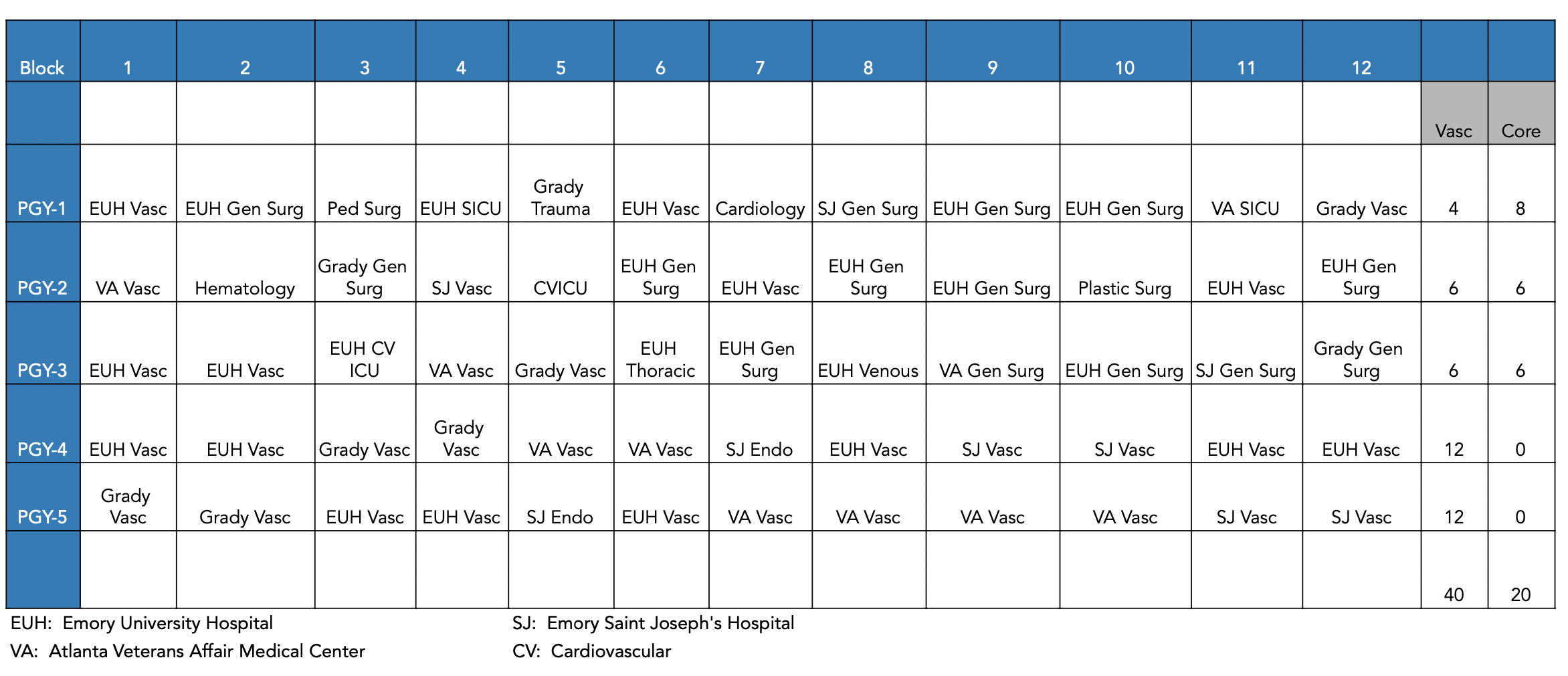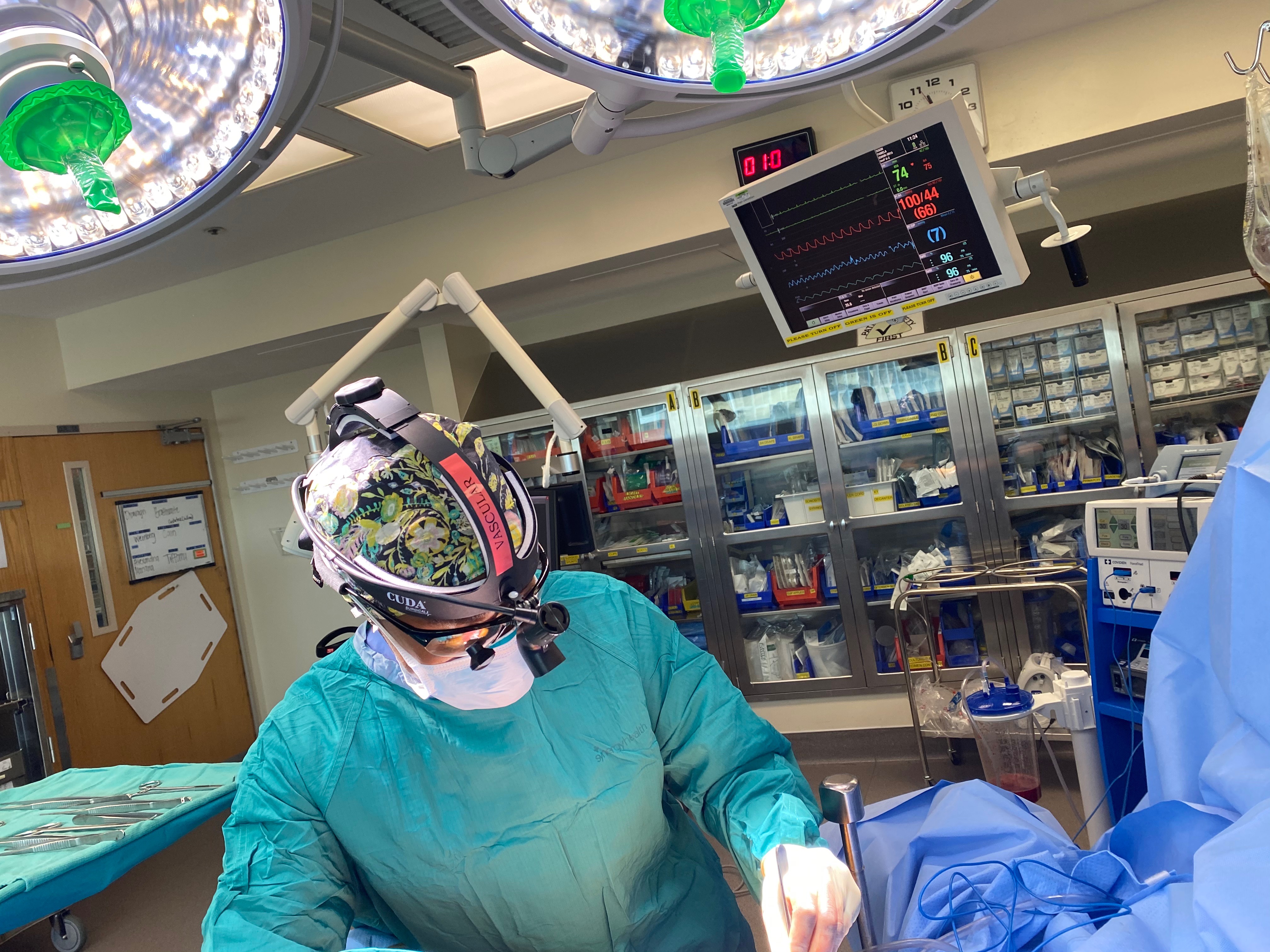Overview
The Emory Division of Vascular Surgery has been a source of clinical, academic, and training innovation in vascular surgery since the 1930s, and is home to one of the first ACGME-accredited vascular surgery fellowships in the country. After reaching consensus upon the imperatives for training medical graduates in the diagnosis and treatment of all aspects of disease, Emory Vascular Surgery initiated its residency in 2018. The program immediately began attracting the most promising medical students in the country, and is primed to produce surgeons that will become future leaders in our field.
Clinical Curriculum
The clinical interests of our faculty — who have trained all over the country — covers the complete spectrum of vascular disease and surgical treatment. This varied blend of specialties spans traditional techniques to the most advanced endovascular methods, and contributes to the development of our trainees' versatile skillsets, adaptable management strategies, and assorted approaches.
Emory vascular surgery residents spend approximately 18 months learning general, plastic, and cardiothoracic surgery skills, gaining familiarity with surgical procedures involving the abdomen, chest, and soft tissue. They are also introduced to critical care therapy from surgical, cardiac, and anesthesia perspectives; learn to manage patients' hypercoagulable and cardiac conditions; and work alongside our fellows, enjoying a larger on-call pool.
In addition to learning modern endovascular techniques, some of which are only available at a handful of centers in the U.S., our residents are taught complex open procedures by faculty experts that receive referrals for such surgeries from all over the world. They gain unique expertise in thoracoabdominal and complex abdominal aortic aneurysms, aortoiliac occlusive disease, carotid disease, and thoracic outlet syndrome, and perform open and endovascular revascularizations for mesenteric, renal, and lower extremities.
As required by the American Board of Surgery, our trainees will develop focused experience and education in non-invasive vascular diagnostics to be competent for RPVI testing. Under the oversight of the director of the Emory Non-Invasive Vascular Laboratory, our curriculum includes training in vascular lab interpretation using both lectures and hands-on training and simulation. Our lecture series also features basic science, research design, and open and endovascular simulation.
Facilities and Rotations
Residents rotate through Emory Saint Joseph's Hospital, an acute care facility in the north Atlanta metro area; Grady Memorial Hospital, one of the largest public hospitals in the Southeast; Atlanta Veteran's Affairs Medical Center, where Emory physicians provide the majority of patient care; Emory University Hospital, an adult, tertiary/quaternary care facility that is consistently ranked the No. 1 hospital in Georgia and metro Atlanta by U.S. News & World Report; and EUH Midtown, an acute care teaching hospital located in the SoNo district of Atlanta. The resulting exposure to diverse patient populations and all aspects of clinical practice gives our graduates the experience to thrive in any practice they choose.
Below is a sample rotation schedule, which is subject to change depending on the specific availability of our partnering subspecialty rotations:

Research Opportunities
The scope of our faculty's research interests allows trainees to participate in either basic science or clinical research endeavors. Current clinical trials that are experiencing active enrollment involve new fenestrated and branched endografts, thoracic aortic branched endografts, and abdominal aortic endografts designed for highly angulated necks. We are also conducting randomized trials in open and endovascular techniques that are helping to shape how vascular surgery is performed around the world.
Our residents are required to present their findings at regional and national meetings and publish their studies in peer-reviewed journals. Trainees are also expected to discuss and exhibit what they have learned when they return from meetings, creating an exchange between faculty and residents that engenders continuous learning and reinforcement of our commitment to inspire our vascular residents to become successful in any practice they choose.
Applications and Inquiries
Dr. Victoria Teodorescu is the program director of the Emory vascular surgery fellowship and residency.
Applications are only accepted through the ERAS system.
For additional questions, concerns, and training verification requests, please contact:
Susan Blackstock
Assistant Director, Programs
404.727.1994


